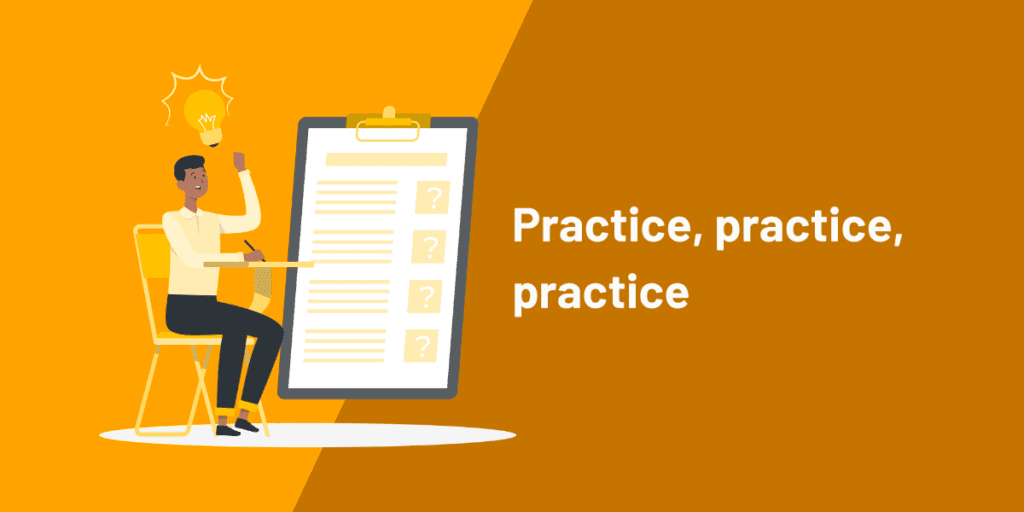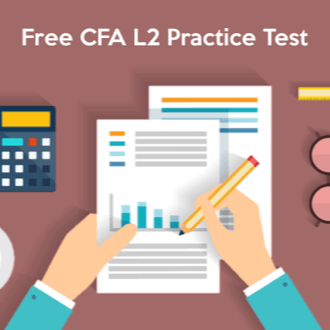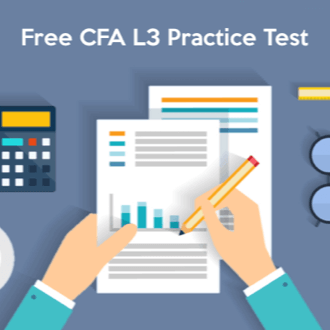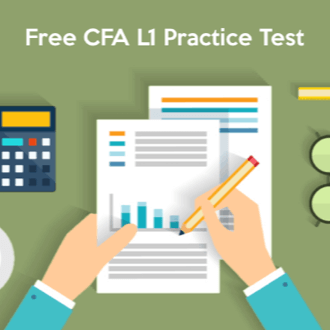We are nearly there candidates – it’s CFA practice exam season!
You might be worried that your scores aren’t high enough. Candidates should be targeting a consistent practice exam score of at least 65% (the higher the better of course). But the score for your first practice exam can be quite low and demoralizing – but that’s pretty common.
But how can you improve your CFA mock exam score?
We’ve done some analysis on the candidate scores for our free Practice Tests and shared some interesting data points, along with some great advice from CFA charterholders on how you can improve your mock CFA practice exam scores before the big day.
Read on to find out more!
- #1. Don’t dwell over a low score. Make it a learning opportunity.
- #2. Review the model answers.
- #3. Have a quick review session on areas you’re unsure of.
- #4. Read the question properly.
- #5. Don’t get distracted from completing practice papers.
- #6. Do your CFA practice exams under timed conditions.
- #7. Avoid getting stuck on questions.
- #8. Make use of CFA Institute’s mock exams.
- #9. Don’t (ever) make your exam ‘open-book’
- #10. Keep practicing! More practice is proven to improve scores.
- Finally, get our free CFA practice questions, available for all levels!
#1. Don’t dwell over a low score. Make it a learning opportunity.

It is very normal – in fact, expected – for the first few practice exams to have a low score. You’re still getting used to the exam format and struggling a little to remember the earlier topics – don’t worry about it.
The best way to cope with this is staying calm. Panicking can quickly lead to demotivation, wasting the progress you made so far by acting irrationally.
The important thing here is to ensure that you have learned and understood where and what you got wrong, so that this mistake won’t be repeated in future papers. After all, we either get it right, or we learn. It’s a win-win.
#2. Review the model answers.
Good quality practice exams have useful model answers where you can learn from – just like mini study notes. It would be a missed opportunity not to go through them, even if you have done the question correctly.
Model answers can clearly reveal your knowledge gaps, more efficient calculation methods, and sometimes even better answering techniques (especially for constructed response section of Level 3). Going through them after grading the paper is an essential part of learning and improving your study memory.
#3. Have a quick review session on areas you’re unsure of.
If there are questions around a topic that you clearly need to read up more about, refer to your study materials!
For example, if you realise that often have difficulty with bond pricing questions, take some time to read up about the section through.
Focused, fast reviewing of topics is the key here: quickly review, because you need to be moving on to the next practice exam.
#4. Read the question properly.

Majority of mistakes made in the actual CFA exam itself – and practice exams – are due to misreading or misunderstanding of the question.
Pressed for time, candidates can sometimes make this same mistake: reading halfway through the question, thinking “yeah, I got this, I know what this question is about and the answer is C!” only to realize that the question said “least accurate”, not “most accurate”, or something equally obvious.
A good tip is to always circle or underline these key words in the question, or when you’re reading a vignette.
Some examples include: “most accurately”, “least likely” or absolutes such as “never, always, just”.
Please read the question thoroughly.
#5. Don’t get distracted from completing practice papers.
Some candidates attempt a practice exam halfway, then decide to stop to review a particular topic.
Don’t do this.
It’s much more important to make sure you get the experience of completing the exam, under time pressure. Or else your results are meaningless as you’re not training for the real thing.
Finish the practice exam, then do the post-mortem and review if you have to. But as the exams draw closer, doing more practice exams is scientifically proven to be one of the best ways to learn. Prioritize this to maximize test score improvements!
#6. Do your CFA practice exams under timed conditions.

One of the main aspects why practice exams are so important is that it gives you a sense check on whether you need to work on your answering speed.
With as little as 90 seconds per question in Level 1, do check to see if timing would be an issue for you during the exam.
You will still fail even if you know your materials 100% if you don’t have time to jot the answer down in the real exams.
#7. Avoid getting stuck on questions.

A related point to answering speed, try not to get hung up on questions you have a bit of difficulty with. I almost failed Level 3 due to this grave mistake.
Once your time per question is nearly up, learn how to skip over questions you know you may need more time on, or simply just developed a mental block with.
Here’s how you can do this swiftly:
- Just circle the question number, as a signal to come back to it later when you’ve extra time;
- For multiple choice questions, select the most probably answer, guess, if you haven’t got a clue. The goal is to not leave the answer sheet blank on these questions, just in case you have no time to come back to them.
- For constructed response questions in Level 3, just jot down some thoughts, formula or even explanation related to the concepts and move on – you may get partial credits for it at least.
- Move on to the next questions and stick to your time per question.
Doing this blitz through the question whilst sticking to your time limit will maximize your test scores and avoid a costly mistake of not completing your paper on time.
#8. Make use of CFA Institute’s mock exams.

The CFA Institute provides each candidate with a few mock exams per level, available from their Learning Ecosystem about 2 months before the actual exam. These questions are designed to mimic the actual exam’s style and topic weight, so it is a crucial resource you cannot afford to ignore.
Make sure you try these mock exams under timed conditions after doing a few third party providers’ papers, as the CFA Institute mock is the closest you get to the actual exam in terms of difficulty and tone, so it is a very useful tool to calibrate your practice.
#9. Don’t (ever) make your exam ‘open-book’
The actual CFA exam is not an open-book exam. So when you’re practicing for it, stick to the same rules.
Practice at answering the questions without help: there’ll be plenty of time for review and learning up later.
You’ll also retain the information better, as your mind focuses more on the question when it doesn’t have a safety net (i.e. “I can just open a book and get the answer!”) to fall back on.
Of course, if you’re really rushing to finish the pile of practice exams you enthusiastically bought five months earlier and need to speed up, there are open-book methods that you can use.
#10. Keep practicing! More practice is proven to improve scores.
Saving the best for last, I’ve some interesting data to share that may help motivate you for the last stretch.
For the past few years, we have been hosting a free Practice Test for every CFA level. Since then, hundreds of candidates have taken the exam, and by observing aggregate trends we were able to draw out some interesting conclusions.
a) Scores improved by 20-25% approaching actual CFA exam day

Up to about 100 days before the exam, scores remained steadily at an average of about 40%, but after that, scores start to steadily trend up.
Right before the actual CFA exam, candidates were scoring an average of about 62%. Not only that, but the variation in scores also tightened as time passed.
What have we learned?
As long as you’re putting in the effort and the hours, trust that your knowledge and ability will improve. It may not seem like it, but you are steadily improving – at an average of 0.22% per day after day T-minus 100!
b) On average, each additional practice exam improved scores by 2-5%

Some candidates also kindly shared some additional data points with us. We asked candidates how many practice exams have they completed previously, hoping to compare that with their practice test scores.
The correlation between the two datasets were very strong – for every additional practice exam a candidate had completed previously, their practice test score improved by an average of 2-5%.
Conclusion?Put in more hours into completing practice exams. Practicing works!
If you need more practice exams to work from, check out our CFA Practice Exam and Review Course Guide.
Finally, get our free CFA practice questions, available for all levels!
Free CFA Level 1 practice questions
We’ve upgraded our free CFA Level 1 mock exam for you with 90 questions.
Score, personalized results and detailed answers will be sent to you upon completion.
Free CFA Level 2 practice questions

This is a 44-question online test for Level 2 candidates.
Score, personalized results and detailed answers will be sent to you upon completion.
Free CFA Level 3 practice questions

This is a 44-question online test for Level 3 candidates.
Score, personalized results and detailed answers will be sent to you upon completion.
How are you getting on with your practice? The finishing line is in sight, so let’s persevere a little while longer and it’ll be over soon!
- Need more practice questions? Check out our Ultimate Guide to CFA Practice Questions
- How to Guess Better in CFA Exams
- What Is A Safe CFA Mock Exam Target Score?
- Check out our Offers page for the latest deals for study materials


Hi! Thanks for the useful insights. Now that the test is computer-based, which means that it is not possible anymore to underline or circle key words in questions, what can candidates do instead to draw their attention to those key words when taking the exam?
Hi Oscar, I believe even with CBT, there are functions you can use to highlight texts in the questions. See our CFA CBT guide for more info, you can also try out the exam software yourself there as well..
Hi, the link to level 2 practice exams does not work.
Thank you